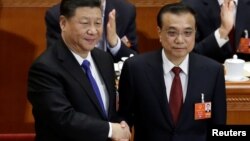China’s largely rubber-stamp parliament Sunday appointed a senior graft-buster as head of the country’s controversial new anti-corruption body, though real power will remain with the ruling Communist Party.
President Xi Jinping has waged war on deep-rooted corruption since assuming office more than five years ago, locking up dozens of senior officials, including the fearsome domestic security chief, Zhou Yongkang.
Supervision Minister Yang Xiaodu, who is also a deputy head of the party’s graft-fighting Central Commission for Discipline Inspection (CCDI), was elected head of the National Supervision Commission.
Zhao Leji, a member of the party’s elite seven-man Standing Committee, remains head of the CCDI. That body will remain and will share many of its functions with the new commission.
Among other votes announced by parliament Sunday were the widely expected re-elections of Li Keqiang as premier and Zhou Qiang as chief justice.
Minister of Justice Zhang Jun was elected head of the state prosecutor.
New commission
On Tuesday, parliament will formally pass the law that will give the new commission its legal framework, the state constitution having been amended last weekend to accommodate the new body.
Some legal scholars have criticized provisions for the new body for failing to protect the rights of suspects during investigations.
Rights groups say the new supervision law will give detentions the veneer of legality, while still risking torture and rights abuses that they say plagued the old system.
A senior official said last week China will revise its criminal law to make way for the new anti-graft commission.
The current supervision law draft fails, for example, to ensure suspects have access to a lawyer during investigations.
The inclusion of such provisions to criminal law in 2012 was seen as making modest progress to combat long-standing issues such as miscarriages of justice and forced confessions.
Xi’s anti-graft campaign has made use of a secretive and controversial system of residential detention, which is outside the scope of China’s criminal procedure law. Xi has pledged to reform the detention system as part of the establishment of the new supervision commission.





